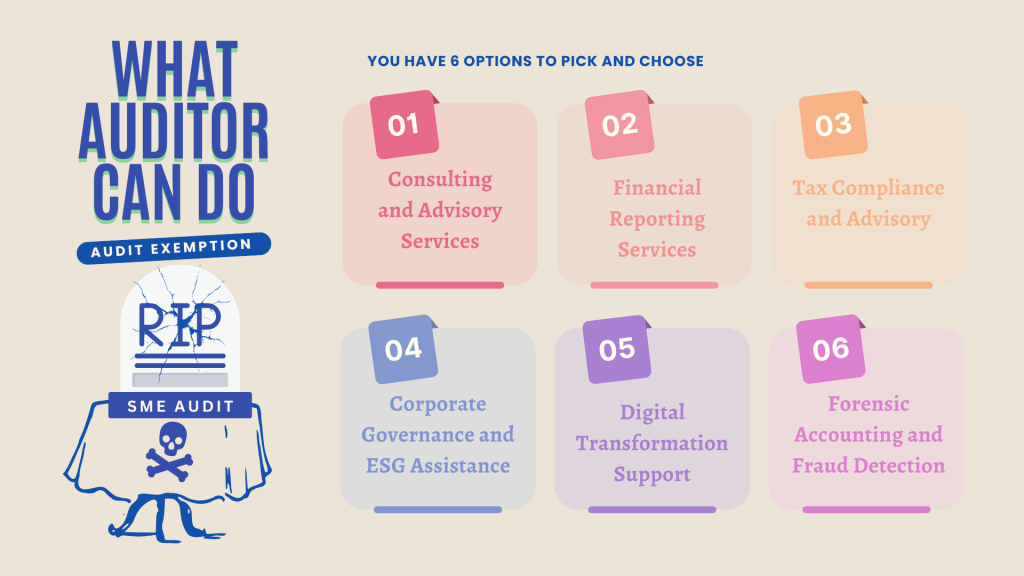The introduction of Malaysia’s updated audit exemption criteria for private companies in 2024 has sparked mixed reactions. While the adjustments aim to reduce burdens for eligible SMEs, they raise genuine concerns about potentially impact on auditors—an industry pillar in the financial ecosystem.
With fewer businesses required to undergo mandatory audits, will auditors face significant income loss? Not necessarily. The challenge—though daunting—also presents new opportunities for auditors to adapt, diversify, and thrive.
Audit Exemptions: A Double-Edged Sword for Auditors
The revised thresholds allowing SMEs with annual turnover and total assets below RM3 million (and fewer than 30 employees) to qualify for audit exemptions will undoubtedly reduce the pool of mandatory audit clients. This is especially significant for small audit firms that currently rely heavily on SME clients.
However, this shift is not all doom and gloom. The audit exemption framework can serve as a wake-up call for auditors to explore alternative business streams that address evolving client needs. Clients won’t stop needing financial accuracy and compliance—they’ll just need it in different ways.

Alternative Revenue Streams for Auditors
To stay ahead, auditors can realign their focus toward fast-growing areas of demand. Here are some smart strategies for adaptation that have proven successful in other regions and industries:
1. Consulting and Advisory Services
SMEs exempt from audits will still require guidance on ensuring their financial records are accurate and compliant. Expand your expertise beyond statutory audits to include areas like business planning, risk management, and performance analysis.
- Example: Auditors in Australia pivoted to provide business advisory services after simplified tax regulations reduced audit requirements for small businesses. Many became trusted consultants steering growth strategies for SMEs.
2. Financial Reporting Services
Even exempt companies must prepare and submit annual financial statements. Auditors can step in to help SMEs with preparing high-quality, compliant financial reports—especially for companies that lack in-house expertise.
3. Tax Compliance and Advisory
Businesses will always have tax liabilities to manage. Auditors can expand services into tax planning, ensuring clients optimize deductions while staying compliant with Malaysian tax regulations.
- For instance, tax advisory has become a major revenue source for UK auditors who diversified when their audit clientele contracted.
4. Corporate Governance and ESG Assistance
Environmental, Social, and Governance (ESG) reporting is a growing priority worldwide. Auditors can help businesses measure, report, and improve their ESG metrics to meet investor and stakeholder expectations.
- Malaysia’s increasing focus on ESG, combined with global trends, makes this a natural expansion. Offer sustainability audits or carbon accounting services to bridge the gap.
5. Digital Transformation Support
SMEs are rapidly digitizing their financial functions to improve efficiency. Auditors can act as technology enablers, offering solutions like system audits, cloud accounting setups, or training on software like Xero or QuickBooks.
- Case in point? Singaporean auditors thrived by becoming certified experts in cloud-based accounting tools after regulatory shifts diminished demand for traditional audits.
6. Forensic Accounting and Fraud Detection
With increasing cyber risks and complex financial frauds, audit firms can pivot toward forensic accounting, investigating discrepancies and helping companies tighten controls against fraud.
7. Outsourced CFO or Bookkeeping Services
SMEs without audits may still struggle to manage their financial operations effectively. Auditors can offer outsourced CFO services, helping companies with strategic financial planning, forecasting, and managing finances.
Benefits of Diversification
Diversifying services not only replaces lost income but also enhances an auditor’s value proposition. By providing a broader suite of services, auditors can become long-term partners for clients rather than fulfilling a single compliance role.
Examples of Successful Adaptation
- Europe: When EU countries introduced simplified audit exemptions, audit firms shifted focus to compliance audits tailored for industry-specific regulations, such as GDPR audits for digital data compliance.
- North America: CPA firms diversified into niche markets like cyber risk assessments and e-commerce financial advisory to cater to rising entrepreneurial ventures.
What This Means for Malaysian Auditors
The key takeaway is simple—adaptability will define the future of the audit industry in Malaysia. While changes to mandatory audits may reduce short-term opportunities, the financial consulting landscape remains rich with untapped potential.
By broadening service offerings to meet SME challenges in compliance, technology, and strategy, auditors can maintain their relevance and profitability. The market shift requires innovation, but it’s a chance to build resilience and create stronger, long-term client relationships.
Final Thoughts for the Audit Sector
Change can be disorienting, but it also sets the stage for evolution. Malaysia’s audit professionals have a unique opportunity to redefine their roles in the financial world. Diversifying services, exploring niche markets, and staying ahead of trends will ensure auditors don’t just survive but thrive.
Are You Prepared for the Shift? Start exploring your options for diversification today. Assess your team’s strengths, outline potential services, and engage with clients to understand their biggest challenges. A proactive approach now can secure your firm’s position in the changing regulatory and business landscape of Malaysia.









